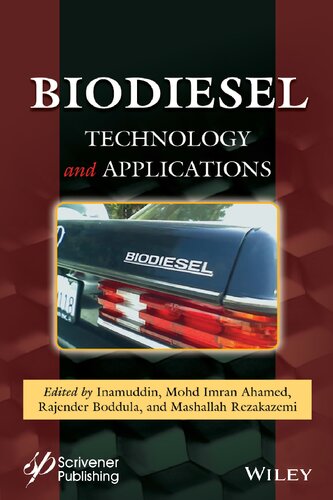

Most ebook files are in PDF format, so you can easily read them using various software such as Foxit Reader or directly on the Google Chrome browser.
Some ebook files are released by publishers in other formats such as .awz, .mobi, .epub, .fb2, etc. You may need to install specific software to read these formats on mobile/PC, such as Calibre.
Please read the tutorial at this link. https://ebooknice.com/page/post?id=faq
We offer FREE conversion to the popular formats you request; however, this may take some time. Therefore, right after payment, please email us, and we will try to provide the service as quickly as possible.
For some exceptional file formats or broken links (if any), please refrain from opening any disputes. Instead, email us first, and we will try to assist within a maximum of 6 hours.
EbookNice Team

Status:
Available0.0
0 reviewsEnergy technologies have attracted great attention due to the fast development of sustainable energy. Biodiesel technologies have been identified as the sustainable route through which overdependence on fossil fuels can be reduced. Biodiesel has played a key role in handling the growing challenge of a global climate change policy. Biodiesel is defined as the monoalkyl esters of vegetable oils or animal fats. Biodiesel is a cost-effective, renewable, and sustainable fuel that can be made from vegetable oils and animal fats. Compared to petroleum-based diesel, biodiesel would offer a non-toxicity, biodegradability, improved air quality and positive impact on the environment, energy security, safe-to-handle, store and transport and so on. Biodiesels have been used as a replacement of petroleum diesel in transport vehicles, heavy-duty trucks, locomotives, heat oils, hydrogen production, electricity generators, agriculture, mining, construction, and forestry equipment.
This book describes a comprehensive overview, covering a broad range of topics on biodiesel technologies and allied applications. Chapters cover history, properties, resources, fabrication methods, parameters, formulations, reactors, catalysis, transformations, analysis, in situ spectroscopies, key issues and applications of biodiesel technology. It also includes biodiesel methods, extraction strategies, biowaste utilization, oleochemical resources, non-edible feedstocks, heterogeneous catalysts, patents, and case-studies. Progress, challenges, future directions, and state-of-the-art biodiesel commercial technologies are discussed in detail. This book is an invaluable resource guide for professionals, faculty, students, chemical engineers, biotechnologists, and environmentalists in these research and development areas.